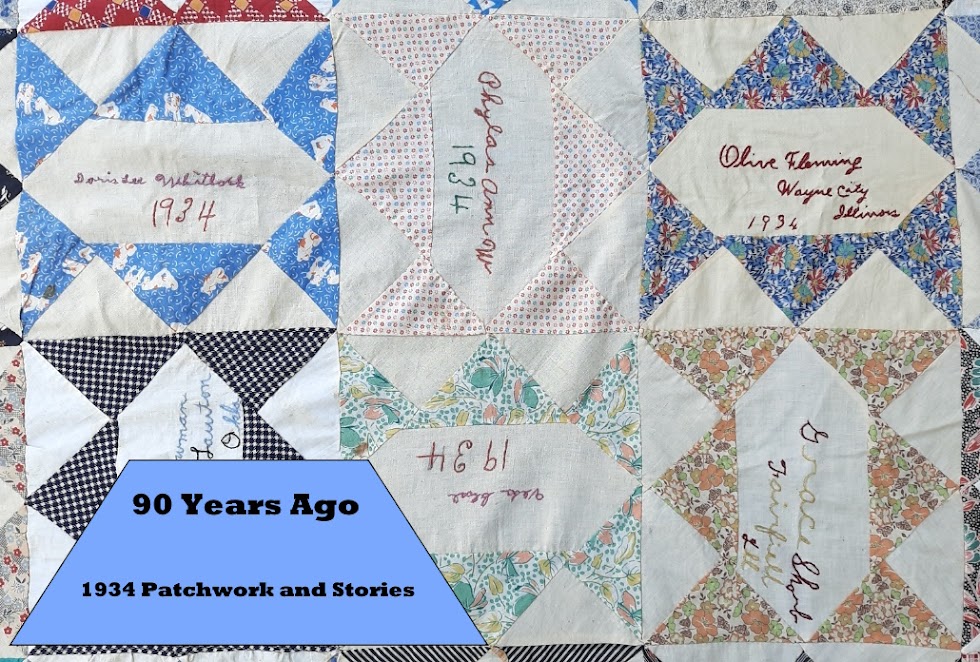I was browsing through the online newspaper looking for the Farm Life patterns when I got distracted.
GLOVE
MAKING A HOBBY
Change
From Fancy Work; Handy Gift For Motorist
All
women, no matter how busy they are, rather like having a small piece of
"fancy" needlework on hand which they can pick up at odd moments when
a friend calls in for a chat. Busy women do not always feel inclined to bring
out the family mending basket on these occasions yet they are not happy if
their fingers are idle.
Winter
afternoons and evenings are more conducive to industry than the summer days.
The woman who loves knitting is never at a loss - there is always a half-finished
sock on hand to click accompaniment to friendly chatter about "the sponge (cake)
that would go blistery" or "the jelly that refused to jell" and
"What can I do about it?" But
there are many women who cannot knit because the ceaseless working of the
fingers or the anxiety in fear of dropping a stitch affects their nerves. These
women prefer the soothing plying of needle and thread.
Today I
am giving you a suggestion for odd moments when you do not always feel inclined
to finish that corner of the drawn-thread design in the tray cloth, or perhaps
the light is not quite good enough for shading the wools for the half completed
tapestry square.
Ingenuity And Practice
Try your
hand at glove-making. The pattern shown in the sketch is simple and with a
little ingenuity and practice the average needlewoman can evolve her own paper
pattern from the sketch. I saw Miss Maude Priest, the artist, making a pair for
herself the other afternoon, and she very generously told me how it is done.
The pattern is in three pieces—the band, fingers, and wrist in one piece, the
gusset (for joining the fingers) and the thumb. The last named looks a funny
shape, but it fits easily and neatly into the scheme of things.
These gloves
are made of chamois leather or doe skin. A whole skin is required to make one
pair, costs from five to seven shillings, and can be purchased at any of the
large shops. When choosing the skin, be careful to pick one that is of even
texture throughout; many are apt to be thinner in some places than others. Do
not cut out the pattern until you are ready to make up the glove, otherwise the
skin is liable to stretch out of shape.
When cutting the pattern on the skin, be careful to get the “pull” going
across the hand, or you will find that the fingers will stretch to twice their length.
It is
quite easy to make one glove in an afternoon or evening, for when once the
pattern is cut out the rest is simple sewing, and there is only one seam at the
side. The hand and fingers being cut in
one piece requires that the pattern has to be reversed for the left hand.
Black
Thread for Smartness
The stitching
is all done by hand on the right side, using a good black linen thread to give
a smart touch. It has the appearance of ordinary running stitch, although each
stitch is worked through and back again singly, and best results are obtained
by using a tailor's needle.
The make-up is all plain sailing - there is nothing
to remember, really. Before folding the pattern to join the one side seam,
stitch the thumb first, and secondly do three lines of stitching on the back of
the hand, about three inches in length. Then stitch in the three gussets
between the fingers, and after that sew a narrow piece of elastic on the inside
of the wrist, and then join up the side seam.
It is not absolutely necessary to
have the decorative fringe as shown in the sketch, but if you like the idea,
cut two strips of skin about one and a half inches wide and sew in when joining
the seam. Cut the fringe after you have inserted the strip in the seam.
These
gloves are ideal wear for motorists, because they are soft and warm, and will
not stick to the driving wheel. Furthermore, they are splendid for night
driving, being of a light color, which makes the hand signals easily seen by
the motorist behind. Ordinary wear and careful washing will give several years of
service.
 |
| What more do I need? Homemade gloves and crocodile shoes. |



No comments:
Post a Comment
I love your comments and am always happy to respond. If you want an answer, check that your profile settings include 'show my email address'; otherwise I can't send you a message.